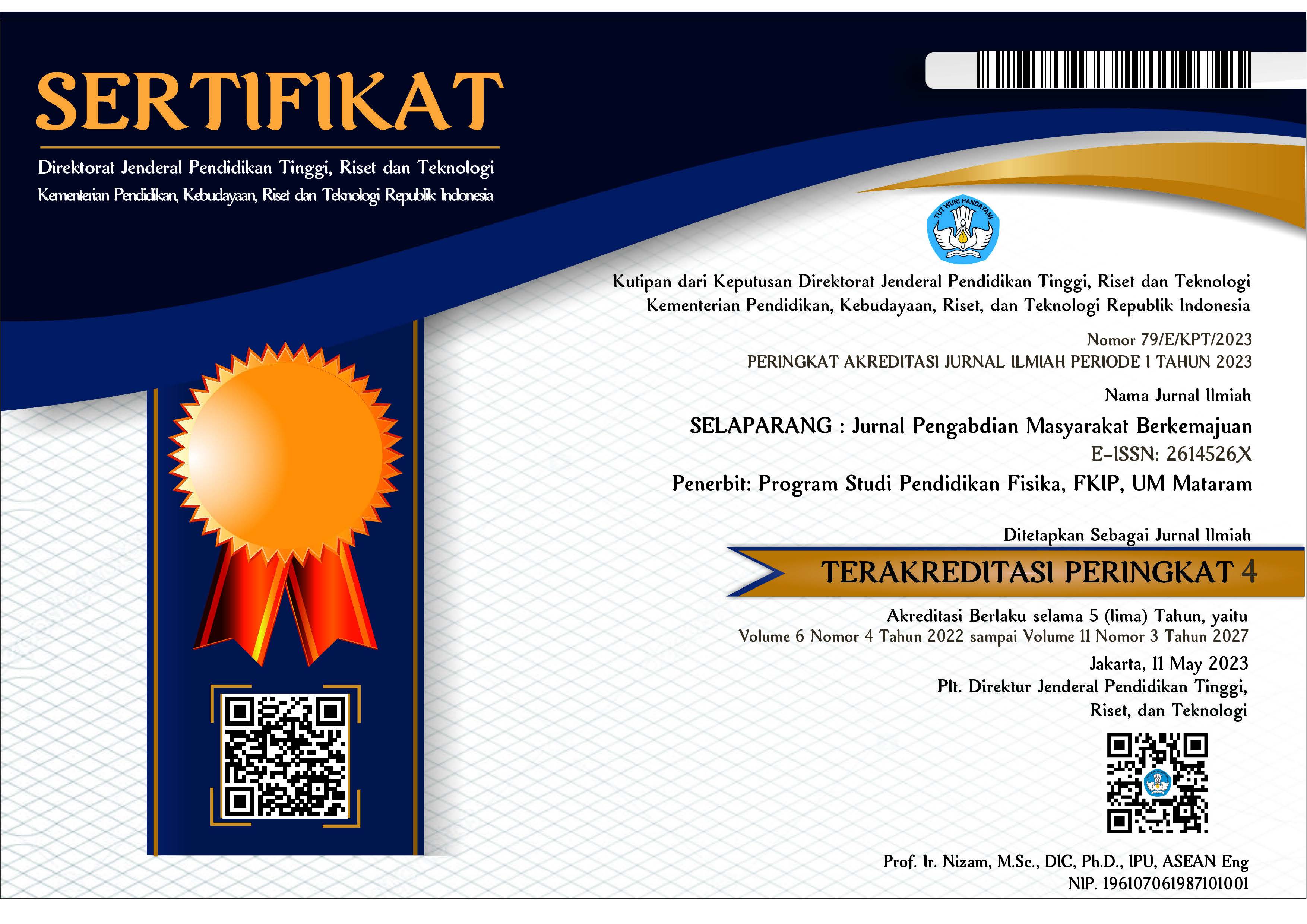PENDAMPINGAN PENGUATAN KAPABILITAS GURU DALAM IMPLEMENTASI PEMBELAJARAN INOVATIF BERBASIS E-LEARNING
Abstract
ABSTRAK
Undang-undang Nomor 14 Tahun 2005 tentang Guru dan Dosen pasal 8 mengamanatkan kompetensi profesional yang menuntut guru untuk memiliki kemampuan dan keahlian dalam menjalankan profesinya serta beradaptasi terhadap perubahan. Di era Revolusi Industri 4.0 dan perkembangan Teknologi Informasi dan Komuninasi (TIK), berbagai transformasi di dunia pendidikan perlu dilakukan. Pemerintah Indonesia juga telah menyusun program digitalisasi pendidikan sebagai salah satu program prioritas. Tujuan dari Pengabdian kepada Masyarakat ini adalah untuk memperkuat kompetensi profesional guru melalui kemampuan menerapkan pembelajaran inovatif melalui e-learning di SMP Negeri 3 Rengasdengklok Karawang. Kegiatan pengabdian kepada masyarakat ini dilakukan dalam bentuk diskusi kelompok, Problem Based Learning serta pendampingan integrasi e-learning. Peserta yang dilibatkan adalah 14 orang guru di SMP Negeri 3 Rengasdengklok. Hasil kegiatan pengabdian masyarakat ini menunjukan adanya peningkatan kompetensi digital guru sebesar 71% dan kesiapan integrasi e-learning sebesar 70%.
Kata kunci: E-learning; guru; kompetensi digital; pembelajaran inovatif
ABSTRACT
Law Number 14 of 2005 Article 8 about Teachers and Lecturers mandates professional competence which requires teachers to have the expertise to conduct their profession and adapt to dynamic changes. Along with the development of Information and Communication Technology (ICT) and the era of Industrial Revolution 4.0, the world of education also needs to transform. Moreover, the Indonesian government has prioritized the education digitalization program. The aim of this Community Service is to strengthen teachers' professional competence through the capability to implement innovative learning through e-learning in SMP Negeri 3 Rengasdengklok, Karawang. This community service activity was conducted in the form of focused group discussions, Problem Based Learning and e-learning integration. The participants involved were 14 teachers. The results of this activity showed an average increase in teacher’s digital competence by 71% and e-learning readiness by 70%.
Keywords: e-learning; teachers; digital competence; innovative learning
Keywords
Full Text:
PDFReferences
Al-Furaydi, A. A. (2013). Measuring E-learning readiness among EFL teachers in intermediate public schools in Saudi Arabia. English Language Teaching, 6(7), 110–121. https://doi.org/10.5539/elt.v6n7p110
Ate, A., Zaineldeenc, S., Zhaohui, C., & Zhao, Y. (2021). Assessing the E-learning Readiness of Universities in Developing Countries and Expected Obstacles. Makara Journal of Technology, 25(3). https://doi.org/10.7454/mst.v25i3.4047
Bahçekapılı, E. (2023). Predicting the secondary school students’ intention to use e-learning technologies. Research in Learning Technology, 31(1063519), 1–13. https://doi.org/10.25304/rlt.v31.2881
Byers, T., Imms, W., & Hartnell-Young, E. (2018). Comparative analysis of the impact of traditional versus innovative learning environment on student attitudes and learning outcomes. Studies in Educational Evaluation, 58(July), 167–177. https://doi.org/10.1016/j.stueduc.2018.07.003
Çebi, A., & Reisoglu, I. (2020). Digital competence: A study from the perspective of pre-service teachers in Turkey. Journal of New Approaches in Educational Research, 9(2), 294–308. https://doi.org/10.7821/naer.2020.7.583
Cheung, R., & Vogel, D. (2013). Predicting user acceptance of collaborative technologies: An extension of the technology acceptance model for e-learning. Computers and Education, 63, 160–175. https://doi.org/10.1016/j.compedu.2012.12.003
Çınar, M., Ekici, M., & Demir, Ö. (2021). A snapshot of the readiness for e-learning among in-service teachers prior to the pandemic-related transition to e-learning in Turkey. Teaching and Teacher Education, 107. https://doi.org/10.1016/j.tate.2021.103478
Dhawan, S. (2020). Online Learning: A Panacea in the Time of COVID-19 Crisis. Journal of Educational Technology Systems, 49(1), 5–22. https://doi.org/10.1177/0047239520934018
El Iq Bali, M. M., Baharun, H., Madanibillah, A., Muali, C., Lukman, Anam, N. K., Zamroni, & Bon, A. T. (2021). Innovative learning media based on e-learning in the new normal era. Proceedings of the International Conference on Industrial Engineering and Operations Management, 6987–6993.
Eliana, E. D. S., Senam, Wilujeng, I., & Jumadi. (2016). The effectiveness of project-based e-learning to improve ICT literacy. Jurnal Pendidikan IPA Indonesia, 5(1), 51–55. https://doi.org/10.15294/jpii.v5i1.5789
Fahdini, R., Mulyadi, E., Suhandani, D., & Julia. (2014). Identifikasi Kompetensi Guru Sebagai Cerminan Profesionalisme Tenaga Pendidik Di Kabupaten Sumedang (Kajian Pada Kompetensi Pedagogik). Mimbar Sekolah Dasar, 1(1), 33–42. https://doi.org/10.17509/mimbar-sd.v1i2.874
Farla, W., Nailis, W., & Siregar, L. D. (2021). Peningkatan Kompetensi Sumber Daya Manusia (Sdm) Guru Di Kota Palembang Pada Era Adaptasi Kebiasaan Baru. SELAPARANG Jurnal Pengabdian Masyarakat Berkemajuan, 4(2), 137. https://doi.org/10.31764/jpmb.v4i2.4241
Iptian, R. (2019). Pengaruh Kesiapan Guru Terhadap Pemanfaatan E-Learning. Jurnal Dinamika Manajemen Pendidikan, 3(2), 72. https://doi.org/10.26740/jdmp.v3n2.p72-77
Lubab El Banan, Fauzi, W. N. (2022). Persepsi Guru Diniyyah Dalam Pemanfaatan Teknologi Madrasah Diniyyah Andalusia Leler. 10(1), 354–360.
Lubiano, M. L. D. (2018). Interactive E-learning portal for enrichment of conceptual understanding of grade 8 learners in phyisics. The Southern Luzon Journal of Arts and Sciences, 9(2), 39–52. http://tilamsik.slsucas.net/issues/tilamsik10/lubiano
Meishar-Tal, H., & Pieterse, E. (2017). Are K-12 teachers ready for e-learning? International Review of Research in Open and Distributed Learning, 18(1), 1–18. http://www.irrodl.org/index.php/irrodl/article/view/2643/4044
Ouma, G., Awuor, F., & Kyambo, B. (2013). E-Learning Readiness in Public Secondary Schools in Kenya. European Journal of Open, Distance and e-Learning, 16(2), 97–110. http://www.eurodl.org/materials/contrib/2013/Ouma_et_al.pdf
Pardede, P., & Sunarto, S. (2020). Persepsi guru dan siswa terhadap pengunaan TIK dalam pembelajaran di sekolah menegah di Jakarya dan sekitarnya. Jurnal Dinamika Pendidikan, 13(3), 226–237. https://doi.org/10.33541/jdp.v12i3.1295
Putri, R. E. (2013). Model Interaksi Dalam E-Learning. Seminar Nasional Informatika 2013/SemnasIF2013, 2013(semnasIF), 209–214.
Ramadan, R., Pradnyana, I. M. A., & Suyasa, P. W. A. (2019). Pengukuran Tingkat Kesiapan Implementasi E-Learning (E-Learning Readiness) Di Sma N 2 Singaraja Menggunakan Model Chapnick. Jurnal Pendidikan Teknologi Dan Kejuruan, 16(2), 258. https://doi.org/10.23887/jptk-undiksha.v16i2.18683
Rofi’i, A., Nurhidayat, E., Firhawan, H., & Prihartini, E. (2023). Pelatihan peningkatan professional competence guru dalam mengintegrasikan teknologi dalam pembelajaran di MGMP Bahasa Inggris SMK Kab. Majalengka. 4(3), 1915–1921.
Sadikin, I. S., Nurchaerani, M., & Lutfiyah. (2022). Pelatihan Integrasi Teknologi Bermakna Dalam Proses Pembelajaran Untuk Meningkatkan Motivasi Belajar Siswa. Community Services & Social Work Bulletin, 2(2), 76–81.
Supriyatno, T., Susilawati, S., & Hassan, A. (2020). E-learning development in improving students’ critical thinking ability. Cypriot Journal of Educational Sciences, 15(5), 1099–1106. https://doi.org/10.18844/CJES.V15I5.5173
Waryanto, N. H., & Insani, N. (2013). Tingkat Kesiapan ( Readiness ) Implementasi E-Learning Di Sekolah Menengah Atas Kota Yogyakarta the Readiness Level of Implementing E-Learning in Yogyakarta High. Jurnal Pendidikan Matematika Dan Sains, 1(2), 117–124.
Yuniarni, D. (2022). Persepsi guru mengenai pentingnya TIK dalam pembelajaran di Taman Kanak-kanak kota Pontianak. Jurnal Obsesi : Jurnal Pendidikan Anak Usia Dini, 6(3), 2411–2419. https://doi.org/10.31004/obsesi.v6i3.1855
Zurita, G., Hasbun, B., Baloian, N., & Jerez, O. (2015). A blended learning environment for enhancing meaningful learning using 21st century skills. Lecture Notes in Educational Technology, 9783662441879, 1–8. https://doi.org/10.1007/978-3-662-44188-6_1
DOI: https://doi.org/10.31764/jpmb.v7i4.19415
Refbacks
- There are currently no refbacks.

This work is licensed under a Creative Commons Attribution-ShareAlike 4.0 International License.
______________________________________________________
Jurnal Selaparang
p-ISSN 2614-5251 || e-ISSN 2614-526X
EDITORIAL OFFICE:



















